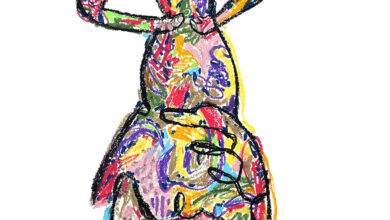Sustainable fashion with a powerful message
A colab between Popup.Lx and Ukrainian designer Kris Bindi
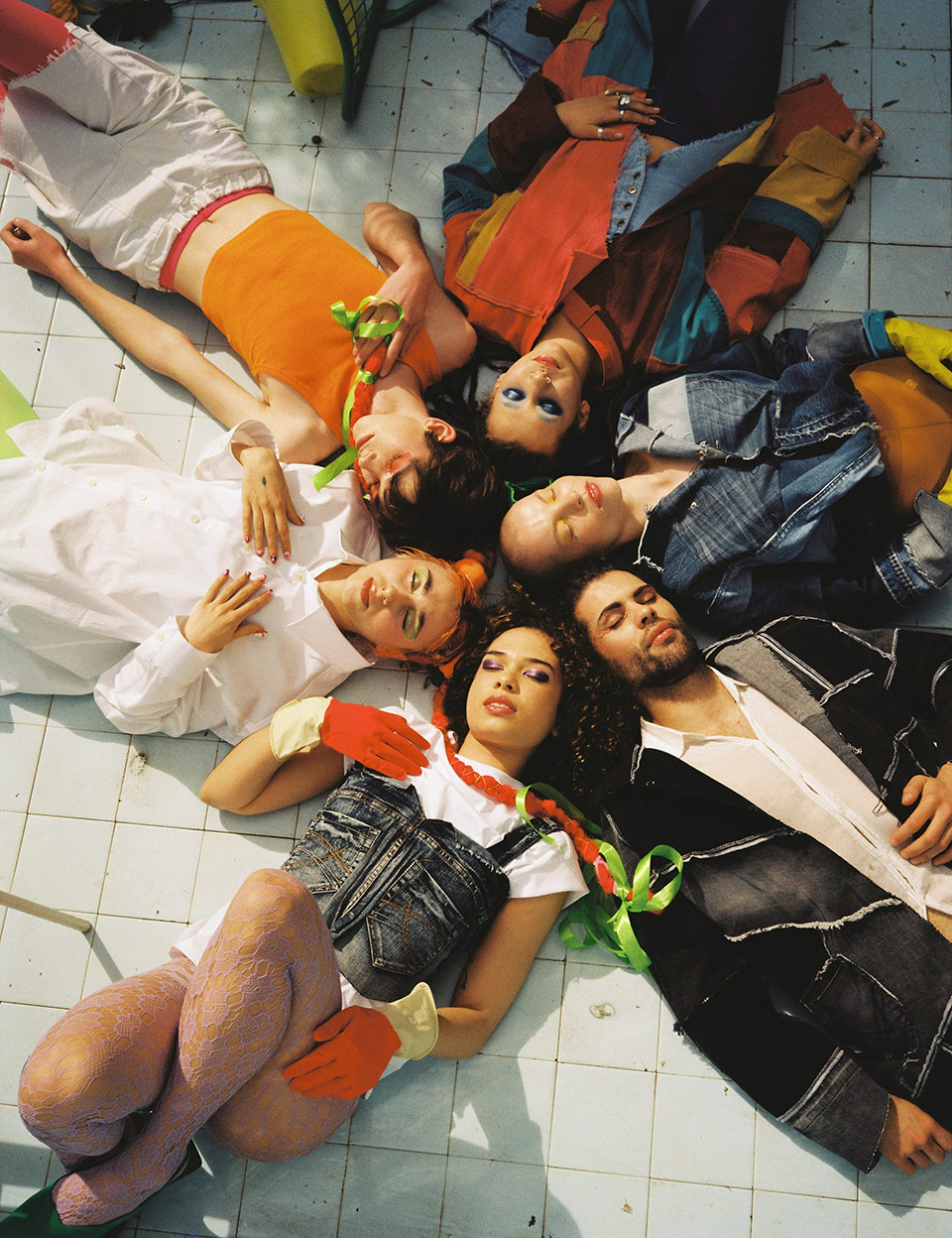
Joana Pinheiro and David Lopes, the creative directors and founders of Popup.Lx and Wink!, have cultivated a platform that embraces vintage and sustainable brands as well as artistic craftsmanship. Their vision revolves around creating a space that showcases unique pieces from small-scale sustainable projects and promotes designers and artists who are often underrepresented in Lisbon and Portugal. Now, they are exited to share their collaboration with Ukrainian designer Kris Bindi.
Featuring Psych0upcycling fashion, designed by Kris Bindi Detka
Creative direction Popup.Lx by Joana Pinheiro and David Lopes
Styling Lis Mulder
Photography Paula Malinowska
Makeup Catarina Mata • Catarina Duarte • Tânia Rute
Models Anna Whittlestone • Bianca • Frederico Simaõ • La Vie de Marie
Rosie • UNAI
Special thanks to Safra.lx for location.
All fashion pieces available at Popup.Lx; all furniture from Wink!
Through the collaboration with Popup.Lx, the Ukrainian designer Kris Bindi who is behind the “Psych0” project is poised to make an impact on the Lisbon sustainable fashion scene. Drawing inspiration from everyday objects, Bindi’s designs incorporate elements of Ukrainian culture and history. With intricate patchwork techniques, she crafts one-of-a-kind pieces, and by combining denim with various textures, colors and patterns, she creates an aesthetic that captivates the senses.
While her creative journey has been filled with achievements, Russia’s full-scale invasion in her homeland is always on her mind. Originally from Odesa, she witnessed the devastating effects of the destruction of the Kakhovka dam when she visited her home. Now she is watching her hometown suffer a bombardment of missile and drone strikes launched by Russia after they pulled out of the Black Sea grain deal. She encourages individuals to stand up against these acts of genocide and ecocide, urging the world not to turn a blind eye.
As she continues her creative path, her determination to create positive change shines through. Her designs not only serve as a reflection of her artistic prowess but also embody the resilience and strength of the Ukrainian people. Through her craft, Kris shows that art and fashion can be powerful tools for activism and social transformation.
“Every voice matters. By standing together, supporting sustainable fashion, and fostering a sense of unity and empathy, we can create a world that embraces diversity, promotes peace, and uplifts those affected by conflict. Let’s use our creativity and compassion to bring about positive change and build a brighter future for all.”
— Kris Bindi

ZOOT: Who is behind Popup.Lx and Wink.LX? What drove you to start the projects and why you did this collab photoshoot?
Popup.Lx: We are Joana Pinheiro and David Lopes, the creative directors and the founders of Popup.Lx and Wink.Lx. Joana’s background is in Social Sciences, with a degree in African Studies and David’s background is in photography and visual arts.
Contemporary art, design, fashion and culture in general are part of our DNA. Both projects reflect our aesthetic choices and allow us to work with artists that we admire.
When we met Lis Mulder she was finishing her studies as a fashion stylist. We got along very well and started to sketch possible collabs straight away. We were about to launch the WINK! Istagram page and she showed interest in doing an editorial bringing together fashion and product design. We gathered an incredible team at Safra and we had a great time working with Lis and all the team.
The result came out great and we really felt flattered to be able to work with so many young and talented people.

ZOOT: Can you tell us about the inspiration and vision behind Popup.Lx and Wink!? What led you to focus on vintage and sustainable brands?
Popup.Lx: When we created Popup.Lx we were much inspired by the variety of designers, artists and brands working with fashion in small scale sustainable projects. Their approaches were very diverse.
We also felt there was a huge misrepresentation of all these talented people in Lisbon (and Portugal in general) . We opened a small shop and created a series of events to promote these works and make them visible to a broader audience. We started with a dozen projects a couple of years ago and now we work closely with more than 200—and growing! Wink.lx is the result of an ongoing project we have been working on for roughly seven years now. It is the result of our research of timeless product design (with a big interest in disruptive movements and technical innovation in certain decades; let’s say postmodern design from late ’60s to 2000) contemporary design and contemporary art.
Both projects share a common vision very much aligned with a purposeful strategy of degrowth*.
*Shifting away from the pursuit of continuous economic growth and moving towards a more sustainable and purposeful society that prioritizes well-being, equality, and ecological stability.

ZOOT: How do you select the brands and makers that participate in Popup.Lx and Wink.LX?
Popup.Lx: Above all we search for designers and artists that we admire and feel passionate about. The small scale production or unique pieces are a preferred criteria. It is important for us to create a closer relationship with each person, so we can have a deeper understanding of their projects and their work processes. Saying this, it is also important to understand that our selection is made with no aesthetic concessions.

ZOOT: What impact do you hope Popup.Lx and Wink.LX will have on the local community and the fashion industry? What message do you aim to send through your projects?
Popup.Lx: With Popup.Lx we are creating business spaces (shop, events and online platforms) to allow these designers to sell their pieces and to be able to move on with their own projects. We are very lucky to be based in one of the most vibrant and multicultural neighborhoods in Lisbon: Anjos, where you can still find a lot of very interesting small businesses, artist studios, etc. We believe that these types of relations in businesses create a greater awareness of the social and environmental impact of our choices as consumers. We promote environmentally-minded work of emerging and established brands, fashion designers and artists.
More than a platform we want to build a community! Wink.LX is based on a logic of non-waste and “degrowth”. As we look for design pieces that were already produced and give them another chance to shine. Most of the design pieces we retrieve were made with the intention to last a life cycle or more! We are pretty aware that this paradigm had a radical 180º spin in the last decades and everything is now made to be disposable in a couple of years. We believe there are other ways. By embedding the principles of the circular economy through the design process, we can make the economy work for people, business and nature.

ZOOT: Can you tell us about the Wink House? How did the idea come about to merge your passion for sustainable brands/makers and vintage furniture?
Popup.Lx: Actually the Wink! House is mainly dedicated to design pieces—vintage and contemporary—and contemporary art. The merge of the sustainable brands/makers will come with the new project.
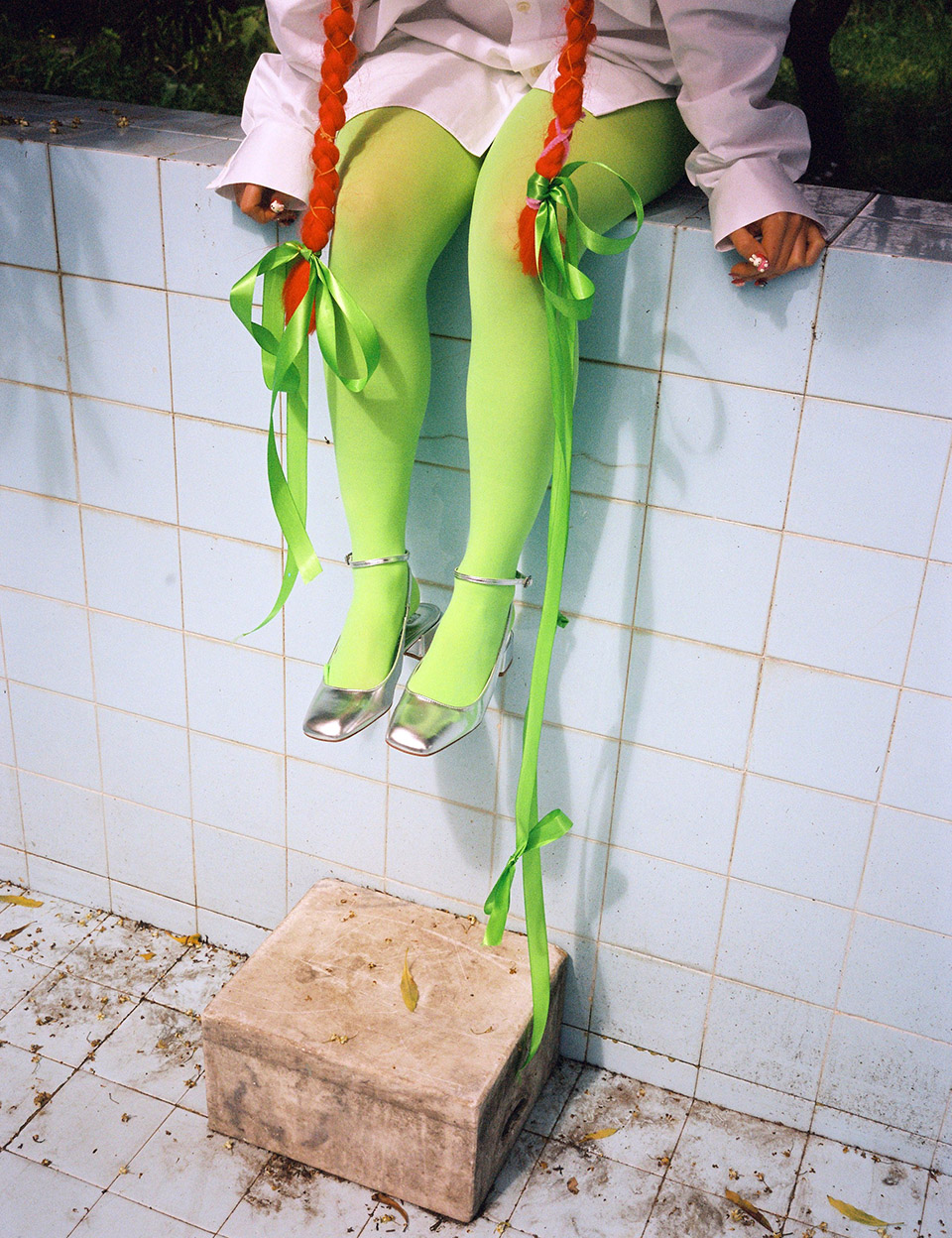
ZOOT: What are your future plans for Popup.Lx and Wink!? Are there any exciting new projects on the horizon?
Popup.Lx: Yes, very soon we will be opening a new space in Anjos. A gallery-concept store where we will bring together design pieces (vintage and contemporary), contemporary art and independent fashion design. Alongside we will have a creative lab to receive a series of creative micro-industries with whom we intend to create some really cool projects and collabs.
We will also host workshops, talks, masterclasses and video screenings. There will be a monthly program of exhibitions, fashion launches and many other events. We like to think of this new space as a living organism where we wish to create synergies between the different areas, stimulating the dialogue and discussion between them and very possibly diluting some of their borders. We are also launching our biannual Independent Fashion event called FLIP SIDE, on October 7th and 8th at Beato Creative Hub.
An event bringing together more than 60 artists, designers and brands under the big umbrella of Slow Fashion. There will be a series of workshops, talks, video screenings, capsule collection launches and catwalks. We want to raise awareness to a vast audience of the many alternatives to fast fashion available in Portugal.
Of course this is also a big opportunity for all the creatives to sell their works, explain their processes and expand their links. There will be music, food and drinks, all aligned with the spirit of the event!

ZOOT: What’s the best way for people to learn about your pop-ups?
Popup.Lx: Through our Instagram pages, Popup.lx and Wink.lx, people can be updated of all our events. At the moment it is possible to see our curated design pieces at the Wink! House, which is our pop-up shop in SAFRA.
Regarding the independent fashion brands you can find us in our pop-up showcases around the city in the coolest venues.

ZOOT: Can you tell us about how you first connected with Kris Bindi?
Popup.Lx: A few days before Slow Down Fest, another event from Popup.Lx that took place in December 2022, we were contacted by Kris Bindi showing interest in having her brand Psych0 there. We really loved her work. She works with denim leftovers and transforms non-wanted denim pieces into new original and unique ones, with an incredible style and quality. After the event we invited her to work more closely with us, she is actually one of our best sellers.
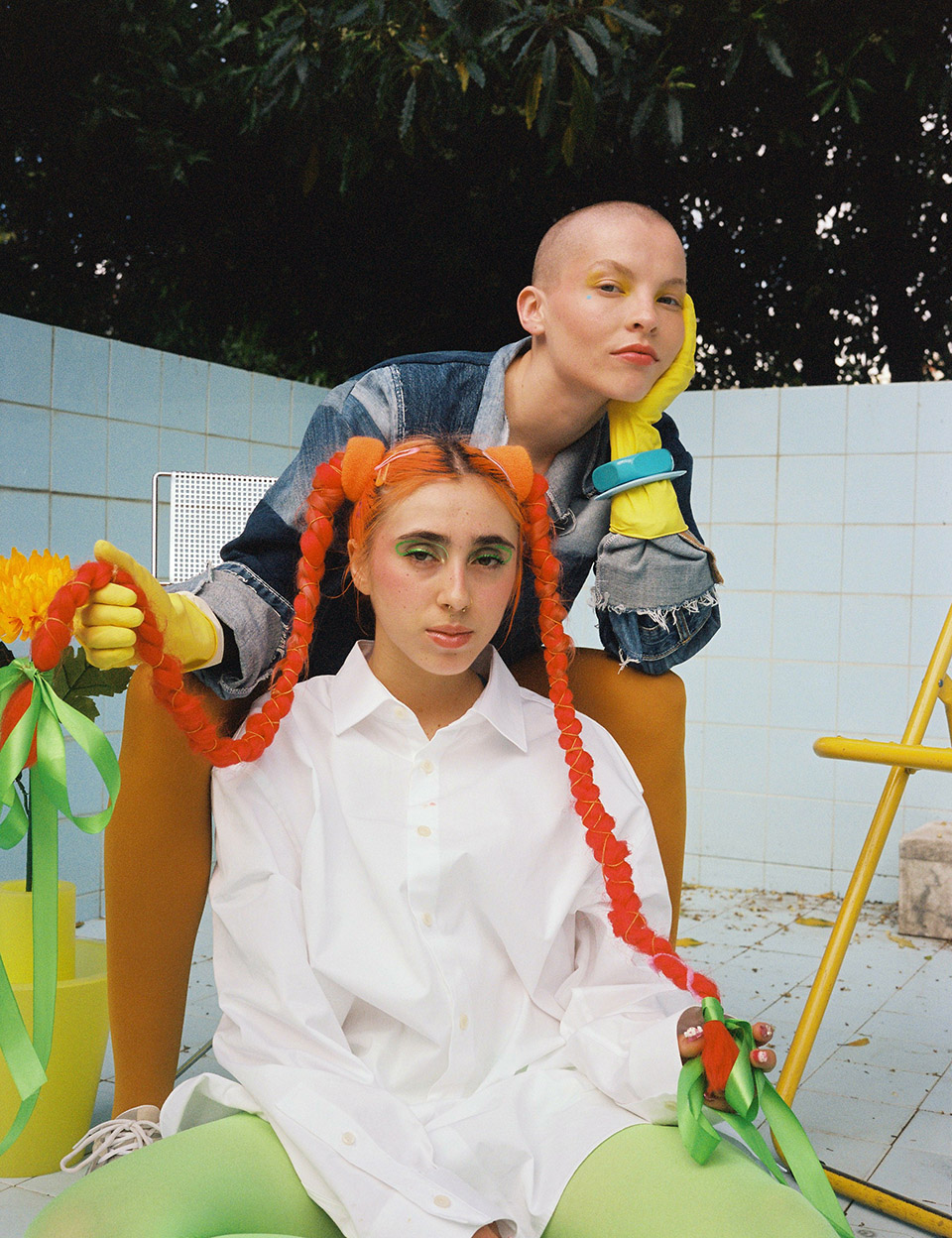
ZOOT: Where are you currently? Can you tell us about your background and what led you into fashion design?
Kris Bindi: Now I am on Greece Island Kefalonia. I came for the whole summer to work under a contract to help my family financially and continue creating the new items online with my mom, who is in our hometown Odesa.
About my background, my mother is a seamstress all my childhood, except for the main work, she sewed clothes for me. When I got older, I always came up with my own outfits, because I didn’t want to wear what was sold in stores. I always enjoy wearing original things, knowing that only I have such. Often after that, my friends wanted the same outfits for themselves and went to my mother to sew something similar.
I enjoyed turning an idea into a finished product, but I always treated it as a hobby. I was fascinated by architecture, so I went to study and received a diploma of an architect-urban planner. In fact, in addition to the creative component, architecture is a lot of physics, mathematics, strength of materials and office work with calculations and drawings. Since I wanted more fun, I took a job at a beach bar, which eventually became a nightclub with a gallery. There I worked as an administrator and created vegan dishes for 5 years. In parallel, I always sewed new things for me and sometimes for somebody else.

Since I was passionate about esotericism, vegetarianism, various mindfulness practices, I decided to create a collection of laconic things from natural materials, and this was the beginning of my design era.
The Psych0 project was born during the first covid lockdown. At that time, I was already seriously interested in environmental issues, sorting garbage and reducing the culture of consumption. Since I liked to create clothes, but at the same time I am a clear opponent of consumer culture, it seemed to me that this was a double standard. And the only way out was to find an alternative that could be useful to society and give me the opportunity to put my ideas into practice. So my mom and I started trying things out of denim.
We are asked our friends to give us old jeans, bought them second-hand and created. First I made were baguette bags and patchwork pajamas with long stripes. Maybe this is still my [calling] card.
Denim is one of the hardest to manufacture and causes great damage to the planet, while it has a very high wear resistance and can be recycled many times. So it’s a perfect hit, plus I love the 1990s and 2000s a lot, and I’m a great fan of denim and total denim looks.
It’s crazy, that this year it became really popular and every famous brand started to do these kinds of items.
But they are very popular and I often hear that it’s like someone else’s. But the truth is that it’s really cool and I’m glad that denim culture is so popular right now. If all these brands also used recycled materials, it would be more great.

ZOOT: How does it feel to be in Ukraine with the war still waging? What was your experience of the early days of the war?
Kris Bindi: I returned home after being in Lisbon for four months. All this time in my hometown Odesa was totally blackout, due to the constant shelling of our energy systems. It was very difficult, because people didn’t have heating, often water, the mobile connection didn’t work. They just came outside and were trying to find places to charge devices and call someone while constant bombing continued. Sometimes I could not get through to my mother and boyfriend for three days. That made me very sad. Often I felt guilty for being safe, for the fact that I have the opportunity to live this life and do things that are not available to Ukrainians now, such as taking a walk at night, because there is a curfew in Ukraine all this time. Remembering the first days of the full-scale invasion is very painful.
I want to focus on this and convey to everyone that this is not a war between Ukraine and Russia, it is an attack and an invasion. All actions take place only on our territory and we are forced to defend our land. I want people to feel the difference between a two-state war and when you protect your home from intruders. We repeatedly heard unpleasant things from residents of other countries and suggestions that Ukraine could make concessions and cede part of its territories in order to end the invasion. Just think how absurd that sounds. I always comes up with the example about how your housemate broke down your door, killed your family and said that now he lives here. I think that it becomes clearer to people after this example.
In the first days of the war, everyone was very scared. The whole country woke up from the screams that began at 5 am. I don’t want anyone to experience these feelings. I slept soundly in our apartment with a boyfriend and woke up already at 8 o’clock. There were already a lot of missed calls and messages from friends from different cities and family on the phone. The first sensation was numbness. We went out into the street where many people were already running. A major collapse began. It was hard to find gasoline in the country, it was impossible to withdraw money from ATMs, to buy food. Just everywhere there are crowds of people who leave for safer places or try to stock up on food for a long time. We decided to wait because we hoped that the world would not allow this invasion to develop and would influence it to end immediately.
For the first few weeks everything was closed. Almost no one went to work. Only grocery stores worked, where there was not much food and there was a strict curfew from 5 pm. The first week I sat at home, I was even afraid to go to my mother on the other side of the city. But over time, everyone began to go to work and tried to live their lives in all conditions.

ZOOT: How has it felt adjusting to life in Lisbon? How did you first arrive, and do you plan to go back?
Kris Bindi: I love Lisbon so much. I was living there before for three mounts some years ago. And earlier I also had visited it. In summer I started to create a new drop; I felt ready to continue after mounts of decline. I was found by guys from a fashion project based in Lisbon and invited to join them. This is a platform that sells things by Ukrainian designers, so my things were also bought for it.
In November I came to Lisbon and lived there for 4 months. We were engaged in various shootings, promotion of the project, took part in several markets. I got along with many wonderful people. I was lucky to live in Lisbon in winter, when the city is quite calm and not filled with tourists.
Although it was difficult for me mentally, I tried to enjoy every day and the opportunities that were given to me as much as possible. I spent a lot of time by the ocean. I learned a lot about Portuguese culture and saw so many wonderful places. I always felt myself like at home in Lisbon, but I wanted to come back to my family. Portugal now is the main place. There I can live, after Ukraine, so I know, that I will return for sure.

ZOOT: How did you become involved with Popup.Lx?
Kris Bindi: We took part in some markets with our fashion project and my Psych0 items. On one in them in Safra I meet Joahna and David from Popup.Lx. They really liked my clothes and proposed to collaborate. I was happy for this opportunity. I like their place and their vibe. They are really doing something fresh in Lisbon and trying to cultivate sustainable fashion, so it was a perfect match. We are keeping in touch and after my work this summer I want to create new items for their place.

ZOOT: How does it feel to be a creator during the war? How does the war and your experience of it show up in your work?
Kris Bindi: Being a creator during the war is a complex experience. It is a mixture of emotions, ranging from sorrow and frustration to determination and resilience. The war and its impact on my homeland deeply affect me, and these emotions often find their way into my work. The struggle, strength and spirit of the Ukrainian people become an integral part of my designs, reflecting the resilience and hope that prevails even in the face of adversity.

ZOOT: Can you tell us more about the inspiration behind the Psych0 project and how it embraces the concept of up-cycling?
Kris Bindi: The inspiration Behind The “Psycho” project comes from various sources. I find inspiration in everyday objects, people’s clothing, nature’s patterns and forms. Additionally, the reworked denim fashion style of the ’90s influences my designs. The project embraces the concept of up-cycling by giving new life to discarded denim and other materials. I aim to transform these materials into unique, sustainable pieces that promote zero waste fashion.
Motivated by the desire to create a positive impact on the environment and promote sustainability, I started the “Psycho” project as a response to the wasteful practices of the fashion industry. I wanted to demonstrate that recycled clothing can be both stylish and environmentally friendly, and that fashion can contribute to a more sustainable world.
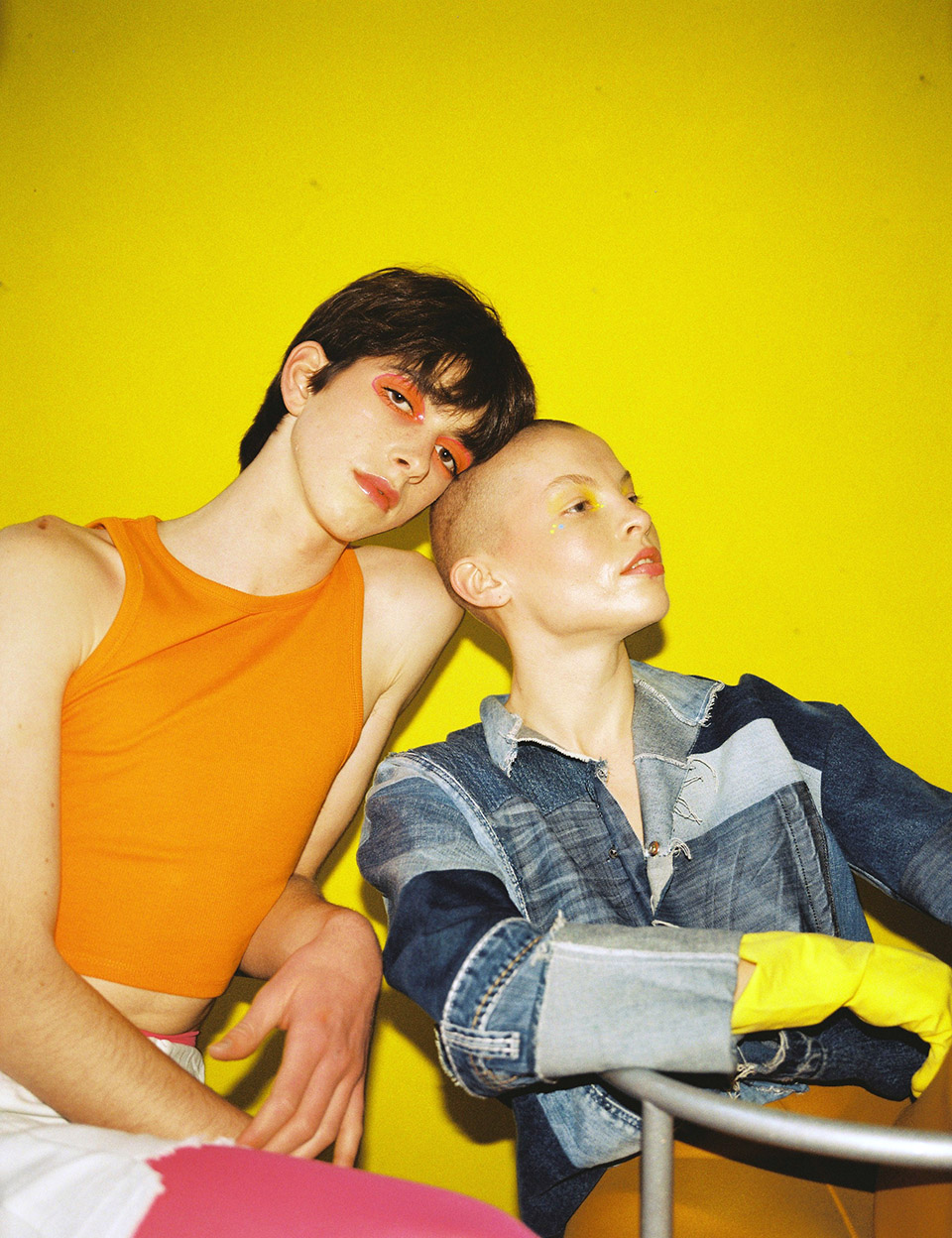
ZOOT: What unique elements or techniques do you bring to your designs?
Kris Bindi: In my designs, I employ intricate patchwork techniques to create unique pieces that set them apart from conventional fashion. I experiment with different textures, colors and patterns, combining denim with other materials to achieve a distinctive aesthetic. Each garment I create tells a story, incorporating elements of Ukrainian culture, history, and the spirit of resilience. By incorporating these elements, I strive to create designs that not only make a fashion statement but also serve as a symbol of sustainable and socially conscious fashion.

ZOOT: What drew you to work with denim as a medium, and how does the process of transforming old denim into new creations inspire your artistic vision?
Kris Bindi: Denim has always held a special place in fashion and cultural history. It represents durability, versatility, and timelessness. These qualities drew me to work with denim as a medium. Additionally, denim is a widely available and often discarded material, making it a perfect candidate for up-cycling.
The process of transforming old denim into new creations is incredibly inspiring to me. Each piece of denim carries a history, and through up-cycling, I can give it a new purpose and life. The challenge of working with reclaimed denim sparks my creativity, pushing me to find innovative ways to combine different pieces, textures, and colors. It’s a process of breathing new life into forgotten materials and creating something beautiful and sustainable.

ZOOT: Where do you source the materials, and how and where do you produce your garments?
Kris Bindi: I prioritize sourcing materials from local thrift stores, second-hand markets and donations. This allows me to repurpose and up-cycle discarded denim and other fabrics, reducing waste and environmental impact. I believe in the power of circularity: giving materials a second chance and minimizing the need for new production.
As for the production of my garments, I prioritize ethical and sustainable practices. I work with skilled artisans who share my commitment to slow fashion and quality craftsmanship.
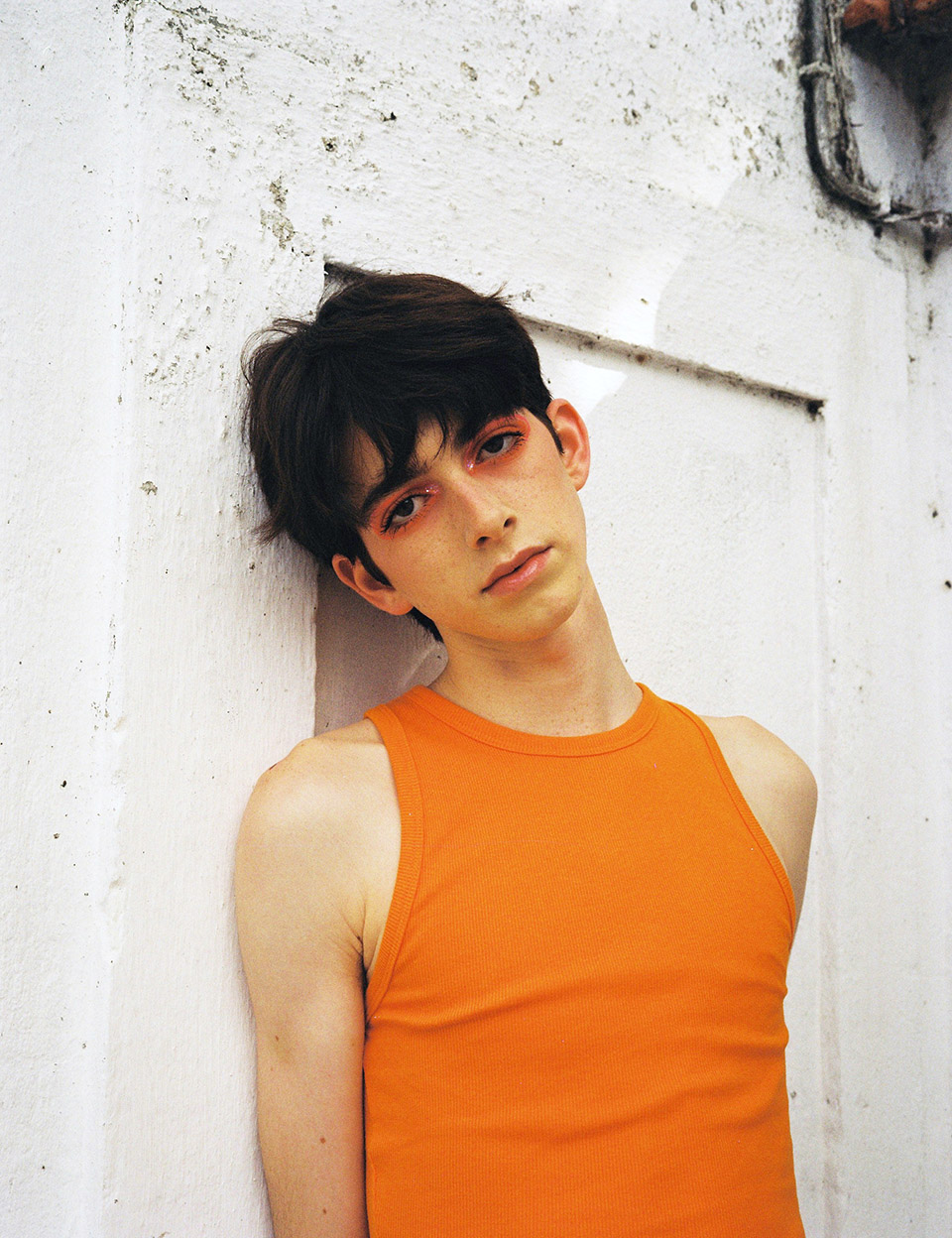
ZOOT: How do you use your artistic platform to shed light on the war?
Kris Bindi: I use my artistic platform to shed light on the war in Ukraine in several ways.
First, in collection themes. I incorporate elements inspired by theUkrainian culture, history and struggles into my collections. Through my designs, I aim to capture the essence of resilience, strength and hope that Ukrainian people have displayed during the war.
Second, storytelling through fashion. Each garment I create tells a story, often inspired by real-life experiences of people affected by the war. By infusing these narratives into my designs, I aim to raise awareness about the human cost of conflict and encourage empathy and understanding.
Third, collaborations with artists. I collaborate with artists, photographers and filmmakers to create visual campaigns and exhibitions that highlight the impact of the war. Through these collaborations, we aim to create a dialogue that transcends borders and brings attention to the ongoing situation in Ukraine.

ZOOT: What can the international art community do to help Ukrainian people?
Kris Bindi: The international art community can play a vital role in supporting Ukrainian people in various ways:
First, solidarity exhibitions. Organizing exhibitions and art events dedicated to Ukrainian artists and showcasing their work can provide a platform for their voices to be heard globally. This helps to raise awareness about the war and its impact on the artistic community.
Second, fundraising initiatives. Collaborating within international art organizations and galleries to host fundraisers that directly benefit affected communities in Ukraine can provide much-needed support. These funds can be used for humanitarian aid, medical assistance and education initiatives.
Third, artistic exchanges and residencies. Inviting Ukrainian artists to participate in international artistic exchanges and residencies can help them regain stability and foster cross-cultural understanding. It also provides them with opportunities to share their experiences through their art.

ZOOT: How do you recommend to keep the rest of the world engaged in what’s happening in Ukraine? How can we all help?
Kris Bindi: To keep the rest of the world engaged in what’s happening in Ukraine and offer support, we can:
First, amplify voices. Utilize social media platforms, traditional media channels and personal networks to share stories, news and perspectives from people directly affected by the war. This helps to counter misinformation and ensures that the global community remains informed.
Second, engage in dialogue. Encourage discussions and forums where people can learn about Ukraine’s history, culture and the current situation. By engaging in open conversations, we can foster understanding, empathy, and a desire to take action.
Third, support diplomatic efforts. Advocating for diplomatic solutions and peaceful resolutions to the conflict is essential. By raising awareness about diplomatic initiatives and supporting organizations working towards peace in Ukraine, we can contribute to long-term stability.

[divider style=”solid” top=”20″ bottom=”20″]
[author title=”Joana Pinheiro and David Lopes, founders of Popup.Lx and Wink!” image=”http://www.zootmagazine.com/wp-content/uploads/2023/07/WhatsApp-Image-2023-07-28-at-18.12.07.jpeg”]The creative directors and founders behind Popup.Lx and Wink.Lx. Joana’s expertise lies in Social Sciences, with a degree in African Studies, while David’s background is in photography and visual arts. Popup.Lx was born from their admiration for small-scale, sustainable fashion projects, aiming to promote talented designers and artists in Lisbon and Portugal. Meanwhile, Wink.Lx emerged from their seven-year research on timeless product design, emphasizing postmodern design and technical innovations from the late ’60s to 2000.
Together, Joana Pinheiro and David Lopes are making a significant impact on the art and design scene, nurturing artists they admire and bringing their vision of innovative, sustainable, and inspiring works to a wider audience.
New Store to be inaugurated in August 2023 in Rua Maria 63, Anjos, Lisboa | @popup.lx | @wink.lx[/author]
[author title=”Kris Bindi, owner and creator in Psych0upcycling” image=”http://www.zootmagazine.com/wp-content/uploads/2023/07/Screenshot-2023-07-28-at-14.41.07.png”]Originally from Odesa, Kris Bindi’s journey into the world of design was deeply influenced by her upbringing and her passion for originality. Growing up with a seamstress mother, Kris was exposed to the art of clothing creation from an early age. She relished the opportunity to wear outfits crafted by her mother and soon began developing her own sense of style, embracing the joy of wearing clothes that reflected her individuality.
As a designer, Kris crafts pieces resonating with those seeking originality and ethical fashion, Bindi’s design philosophy reflects dedication to sustainable, eco-friendly fashion, intertwining art and mindfulness. Her creations empower wearers to embrace individuality while making a positive impact on the planet.
@kris_bindi_detka I @psych0upcycling [/author]




